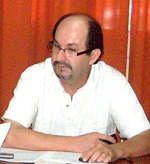Paraguay: community radio stations pressure Parliament
Published on Tue, 2011-08-16 09:09
Source: Campaña por la Expresión Ciudadana The telecommunications bill that is currently before the Paraguayan Parliament does not establish media communications as a universal right of all citizens but considers it a product in the market place. According to Rubén Ayala, the coordinator of the Association of Community Radio and Alternative Media (Voces Paraguay), in a statement on the portal of the Campaign for Citizens Expression (Campaña por la Expresión Ciudadana), the focal point of Social Watch in the country, one of the motives behind this restrictive proposed legislation is that it would limit the power of community radio stations and civil society organizations and prevent them from obtaining finance by selling advertising. In addition, the “most worrying” aspect of this initiative is that “it does not promote equality of access for all sectors to the mass media in general and radio broadcasting in particular" and so "freedom of expression is limited to the economic possibilities of the business sector". This means other "sectors of society cannot exercise this right because they are being denied access to channels of expression.” Ayala explained: "At the first and only meeting we took part in”, at the Science and Technology Commission of the Chamber of Representatives, "we urged the legislator (Héctor Ocampos, who is promoting the initiative) that there should be prior wide-ranging democratic debate involving various sectors of civil society, social organizations, the private sector and the State institutions in charge of media policy. We have called for a new telecommunications law that establishes media communications as a right of each and every member of society and not as a product in the market. This would ensure that different voices could be heard and various social sectors would have access to the media and a range of information sources. Unfortunately this appeal was brushed aside, and the discussions continued just with the business sector representatives that had been invited.” Ayala continued, "There is no doubt that the telecommunications law is in need of complete reform” as the legislation in place “is more than 15 years old and is seriously limited in terms of rights and democracy". It is also “out of date” when we consider "technological progress and the new media communication modalities". "However, the draft of the new bill leads us to suspect that the underlying aim is to consolidate the power of the sectors that dominate the media, and the proposed law will work against diversity and plurality because it will promote the production of material and information that embodies one single vision of society and of the world. This policy is extremely sector-specific and discriminatory." Ayala pointed out that the new law would not "prevent the media from falling under monopoly and oligopoly control”, and thus would amount to creating a vacuum "harmful to the construction of a democratic culture and the consolidation of democracy itself.” Like the old law, the bill contains "articles that restrict and discriminate against community radio stations and therefore communities and social organizations as well. It gives them an energy allocation of only 30 to 50 watts, and it blocks them from having any kind of financial sustainability by banning advertising in both the public and the private sector”. As a sarcastic illustration of what this "terrible discrimination and attack on freedom of expression" amounts to, Ayala imagined a parliamentary debate in favour of the bill: “You businessmen here, you gentlemen of money, you can speak and make your voices heard with 1,000 to 50,000 watts of energy … and you, the communities, social organizations and general public, you can speak and say what you think and feel with 50 to 300 watts of power.” Ayala quoted a report by the Inter-American Commission on Human Rights (IACHR), which says that "States have the obligation to guarantee, protect and promote the right to free expression with equality and without discrimination, and also society’s right to be exposed to all kinds of information and ideas". Ayala said that in the process of debating the new bill Parliament ought to include the Paraguayan Union of Journalists, public and private universities that give mass media courses, human rights, social, peasant, cultural and artistic organizations, and other organizations that analyze aspects of the media in relation to marginalized population groups, including women, children, adolescents and indigenous people. He summed up the situation up as follows: "We seek a telecommunications and audiovisual communication services law that recognizes the right to media communication and guarantees, protects and promotes freedom of expression under equal conditions and with no discrimination, and also society’s right to receive all kinds of information and ideas. The law should rule out public or private monopolies of the ownership and control of the mass media and promote access for different groups to radio and television frequencies and licenses in all technological modalities. One of the basic requirements of the right to free speech is that there should be broad pluralism as regards information." Ayala concluded by saying, "Democracy needs debate, discussion and the interplay of opposing ideas. If there is no debate, or where it is weakened because sources of information are restricted, this constitutes a direct attack on the main foundations of how democracy functions." |
SUSCRIBE TO OUR NEWSLETTER



